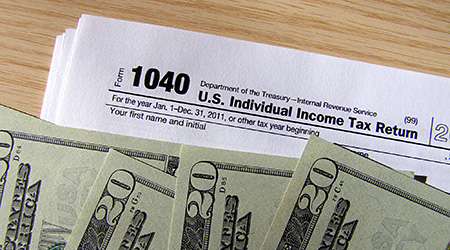When Does A Person Not Have To File Income Taxes?

Filing income taxes is a common annual requirement for most adult but that's not always the case. Obviously there certain circumstances such as unemployment or students who may not need to file personal income tax returns for a given year. Depending on the amount of income you received from dividends and capital gains in addition to any other ancillary sources then you may or may not have to file your taxes.
If you get a W-2 then it is virtually guaranteed you will need to file income taxes as it is practically impossible for an employer to pay someone less than $600 a year. The $600 per year amount is the minimum or maximum, depending on how you look at it, amount were anything over $600 is reported to the IRS in a Form 1099. This is to prevent a deluge of paperwork from being filed with the Internal Revenue Service because someone got $20 to mow a lawn or $60 to house sit for a weekend. At the point where an individual is making over $600 the expectation is that they are working, at least on a part-time basis, and will probably make more than that amount before the tax year is out. If however you make less than $600 then that person will not have to file income taxes for that year.
Even unemployed individuals may have to file federal income taxes if they get income from other sources. It is possible for unemployed or retired individuals to still generate income from interest on savings or money market accounts or capital gains distributions and dividends from stocks and mutual funds. It is important to understand the various sources of income because when you're trying to determine whether or not you have to file income taxes you need to understand what is sent to the Internal Revenue Service. $70 in dividends here and $25 in interest there adds up and financial institutions are legally responsible to send reports for all account holders to the IRS. It is very easy for a person to think that they do not have to file income taxes when in reality they had enough aggregate income to justify filing. If you miss a statement here and there and think you don't have to file but are subsequently audited you may have to pay penalties and interest if your income was more than your personal exemptions. This normally doesn't happen because personal exemptions can be anywhere from $7,000 - $9,000 but it is still something to be aware of as a possibility.
Whether or not you are a person who does not have to file income taxes will be dependent on the amount of income you receive from multiple sources and your level of honesty. Working under the table for a company is illegal because it deprives state and federal governments of valuable financial resources to operate. Many individuals and businesses work on a cash only basis and it is important for them to keep track of all income to determine if they do or do not have to file income taxes. This is an individual decision but for the most part if you're honest and haven't had any significant sources of income for the year then that is a person who will not have to file income taxes.
Elsewhere on StockMonkeys.com







